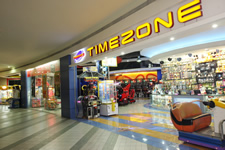Timezone, one of the major players on the Australasian operating scene, has seen encouraging expansion in recent years.

The company now operates family entertainment centres in seven countries - Australia, India, Indonesia, New Zealand, Philippines, Singapore and Vietnam. Many of its 200 plus outlets are situated in high-end shopping malls and its employee count comes to over 2,300.
"We believe the FEC business is a fashion business," the company’s Sonaal Chopra told InterGame. "As a result, Timezone is continually looking towards the future and seeking new and inspirational ideas. Our organisational vision has a lot to do with innovation and creativity."
He added that a lot of thought goes into providing a high quality fit-out that appeals to families. "Having a bright, wholesome environment is an important element of the overall fun experience. The key to a successful FEC is providing excellence in customer service, attractive value-based offers and the right products and attractions that customers feel comfortable and safe with in the location."
The Timezone Group buys products from a wide range of suppliers from countries such as the US, Japan, Taiwan and China. "If the quality of a product appears to be good, we like to buy a number of sample units to test within the group in the different regions," said Chopra.
"We buy quite a few games from LAI Games, an associate company of ours. We work closely with them in the early research and development stages. Games like Stacker and, more recently, Little Masterpiece and Super Strike have continually performed well. We have also found that some machines or attractions can often work better in one country compared to another."
It is also true that some regions are performing stronger than others for Timezone. "However, throughout all regions we are still seeking new opportunities and opening new locations. In times of recession, history has shown that people do look for low-cost entertainment and value-based food and beverage. Customers are especially attracted to a good, value-based offer that they can share with family and friends. We do feel lucky that we are in the FEC business."
India, especially, has been a happy hunting ground for the company in recent times. Said Chopra: "India is certainly one of the fastest growing regions, especially with the number of new malls opening. These openings are taking place from the west to the east coast and the country is still poised for further fast growth.
##image2##
"We have a target to open over 100 points of presence there in the next three years. We are currently in four major cities within India with strong growth plans in place for the next 12 months."
Australia has also been strong, with several new store openings in the last 12 months. "Franchising has been proved to be a winner there," said Chopra. "Even our competitors are considering a change to the Timezone brand - there have been three competitor locations in the last 18 months that have moved over to be a Timezone."
Also, Timezone recently acquired another competitor chain in Singapore and is now the largest operator of FECs in that region. "All the other regions in which we have a presence have also seen steady growth," added Chopra.
Having created such a presence for itself in Australasia, does Timezone have its sights set on Europe or the US? "We are already in the process of due diligence for the US and European markets via the franchising of our brand, acquiring an existing network or merging with an existing player."
Chopra believes that the most significant step the company has made was its expansion beyond its native Australia. "The first overseas Timezone opened in Bali, Indonesia, in the mid-1990s and it grew from there," he told InterGame "Targeting families was a key factor, creating a strong redemption mix in machines and other attractions.
##image3##
"It was also a happy moment for us when we saw our market share rise above 30 per cent in all the market we operate in. Branding is also an area that we look at to continually evolve. Ranging from our key fit-out elements to other various attributes, we are mindful that we need to reflect and complement the core values of the Timezone brand. Brands help people to define themselves. It is believe that companies don’t own brands - consumers own them."
Being successful is also about competing with other areas of entertainment, particularly the home console market. "The key factor here is to offer a fun experience that people cannot easily have at home. People are communal and like to gather with friends or family and have fun. The industry needs to keep reinventing the wheel, offering new experiences and, most importantly, provide take-home value."
Chopra added: "It is vital that we do not become complacent. To be a winner in this industry we need to be passionate about how we apply ourselves and continually try to look and think outside the box. As trends change fast, we need to be able to identify those changes, not procrastinate, and move with those trends as they happen. If we don’t, others will."

